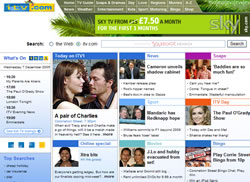 The Digital-Lifestyles office is in a state of total confusion over major UK broadcaster, ITV, buying the Web Site, Friends Reunited (FR).
The Digital-Lifestyles office is in a state of total confusion over major UK broadcaster, ITV, buying the Web Site, Friends Reunited (FR).
Our reaction when we initially heard of the deal was – What? Why? How much!?
It’s been widely reported that ITV is paying £120m + £55m in bonuses for FR. The site that has been running for four years, currently has 12m members and is expected to make revenues of £12.4m this year.
It’s not that we don’t think that businesses should appear to diversify. We’ve been clear that we think eBay’s purchase of Skype was genius. The major difference, beyond the value to the transaction, is that Skype is still growing.
What?
We think that FR has done an amazing sales job on ITV. It’s a site that would appear to be in decline rather than its ascendancy. Their expansion into Genes Reunited, Dating and Jobs Reunited would appear to point to them thinking the same.
If you look at why FR worked, we think it’s because there were generations of school leavers going their separate ways prior to the Internet, leading them a very limited means of contacting their previous peers.
 The school leavers departing since the wide use of the Internet, will not have to resort to third-party services – the majority of them will have an online presence, allowing direct contact, if desired.
The school leavers departing since the wide use of the Internet, will not have to resort to third-party services – the majority of them will have an online presence, allowing direct contact, if desired.
Why?
ITV are suffering. The business that, when it was launched fifty years ago, was described as a ‘license to print money’ has gradually slipped to a low grade, trashy set of channels. It’s widely thought of as a bit of a joke with appalling programming.
70% of ITV’s revenues come from Ad sales on its flagship channel, ITV1. The word in media circles is that ITV1 is now struggling to sell ads, as the audience generally drops off (the exception to this being their recent reality show, ‘I’m a celebrity, get me out of here’), and goes down market.
ITV do have a huge advertising sales department that has been merged across all of its regions. Bringing FR into this sales force will give better economies for ITV, letting them squeeze additional profits from FR. It will also give ITV the chance of selling adverts across TV and the Web – extracting additional cash from the advertiser.
![]() Another benefit will be letting ITV have access to the 12m members of FR, allowing them to expose the online FR audience to promotion of ITV’s programming, if they’re UK based. Later this can be expanded to on-demand sales.
Another benefit will be letting ITV have access to the 12m members of FR, allowing them to expose the online FR audience to promotion of ITV’s programming, if they’re UK based. Later this can be expanded to on-demand sales.
When we sat around at Digital-Lifestyles to come up with other reasons, one that came up was the possible creation of a programming strand or, heaven forbid, whole channel covering the now-various services of FR. eg reality programming following a group of FR subscribers going through the steps to ‘reunited’, with the trial, tribulations and toe-curingly moments that it would entail.
The question we keep on coming back to is, Is this this really worth £10-£14.50 per FR member?
Even after ITV boss Charles Allen has tried to explain the deals advantages, we’re still not convinced.
This deal brings to mind ITV’s disastrous, misguided huge, £788m investment into ITV Digital – their attempt to take on BSkyB in the UK. The service collapsed in 2002, later to reborn as Freeview.
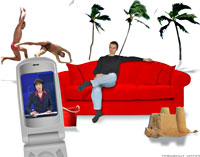 Vodafone has started to roll out its global Mobile TV channels, serving up a feast of “world-class TV brands, pan-European sports coverage and leading entertainment and documentary programmes”.
Vodafone has started to roll out its global Mobile TV channels, serving up a feast of “world-class TV brands, pan-European sports coverage and leading entertainment and documentary programmes”.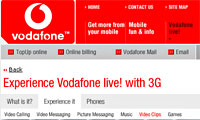 Sports fans will be kept amused on the move with Eurosport, UEFA Champions League and, err, Chilli TV (who?) channels, with the Vodafone service also carrying popular channels like MTV and Discovery.
Sports fans will be kept amused on the move with Eurosport, UEFA Champions League and, err, Chilli TV (who?) channels, with the Vodafone service also carrying popular channels like MTV and Discovery.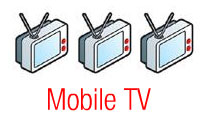 Vodafone say that their research into the market revealed that Mobile TV complemented television viewing habits at home and thus demonstrated a hearty appetite for the product amongst consumers.
Vodafone say that their research into the market revealed that Mobile TV complemented television viewing habits at home and thus demonstrated a hearty appetite for the product amongst consumers. NTL is currently in talks to merge with Virgin Mobile in a deal that would create a potential rival to the now
NTL is currently in talks to merge with Virgin Mobile in a deal that would create a potential rival to the now  In a fiercely competitive market, cable companies on both sides of the Atlantic are looking to outflank their satellite and phone company rivals by adding mobile phone services to their portfolio of voice, Internet and TV services.
In a fiercely competitive market, cable companies on both sides of the Atlantic are looking to outflank their satellite and phone company rivals by adding mobile phone services to their portfolio of voice, Internet and TV services.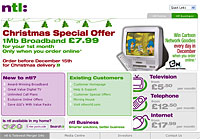 NTL and Telewest have notched up around 5 million subscribers combined, next to BSkyB’s 7.8 million digital television viewers.
NTL and Telewest have notched up around 5 million subscribers combined, next to BSkyB’s 7.8 million digital television viewers. The words European and Commission, when used together rarely equate to clarity. This is holding true with the mixed signals on the financial support that will be permitted in the transition to Digital TV across Europe.
The words European and Commission, when used together rarely equate to clarity. This is holding true with the mixed signals on the financial support that will be permitted in the transition to Digital TV across Europe.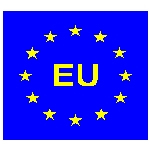 The Commission made clear that it supports the transition to digital broadcasting, and that Member States have a variety of methods to assist the digital switchover, that fits in with EC Treaty state aid rules.
The Commission made clear that it supports the transition to digital broadcasting, and that Member States have a variety of methods to assist the digital switchover, that fits in with EC Treaty state aid rules.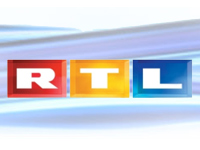 Europe could benefit economically and socially, by a concerted approach across Europe to the ‘liberated’ spectrum. The EC wants to see trading in radio wavebands (much championed by the UK regulator OFCOM) and believes that this could assist European firms in launching innovative products and services. A study commissioned by the executive indicated that the move to Digital would have potential benefits of around EUR 9 billion for community members through greater efficiencies.
Europe could benefit economically and socially, by a concerted approach across Europe to the ‘liberated’ spectrum. The EC wants to see trading in radio wavebands (much championed by the UK regulator OFCOM) and believes that this could assist European firms in launching innovative products and services. A study commissioned by the executive indicated that the move to Digital would have potential benefits of around EUR 9 billion for community members through greater efficiencies. Yesterday evening saw a celebration of The Legacy of Arthur C Clarke at the IEE in London.
Yesterday evening saw a celebration of The Legacy of Arthur C Clarke at the IEE in London.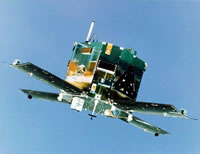 Professor Barry Evans of the University of Surrey considered the 1980’s and 90’s were probably the golden age for communication satellites and predicted their future as an infill technology. Working alongside terrestrial delivery systems, with the possibility of satellite providing TV connectivity to mobile devices outside the fibred home.
Professor Barry Evans of the University of Surrey considered the 1980’s and 90’s were probably the golden age for communication satellites and predicted their future as an infill technology. Working alongside terrestrial delivery systems, with the possibility of satellite providing TV connectivity to mobile devices outside the fibred home. In a sure sign that TV to the mobile is the new European media battleground, 3G mobile operator 3 Italia have announced its plans to purchase the Italian national broadcaster, Canale 7. Reports have put the price of the acquisition at between €30-35m.
In a sure sign that TV to the mobile is the new European media battleground, 3G mobile operator 3 Italia have announced its plans to purchase the Italian national broadcaster, Canale 7. Reports have put the price of the acquisition at between €30-35m.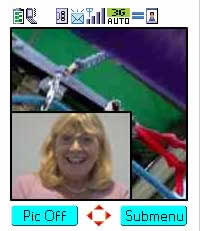 The company intends to offer a DVB-H mobile TV service from the second half of 2006. Indications are that there will be a minimum of 20 channels, although no line up has yet been decided. 3 Italia already carries Playboy adult entertainment and football via existing technology, and has worked with Mediaset and News Corp’s Sky Italia pay-TV operator.
The company intends to offer a DVB-H mobile TV service from the second half of 2006. Indications are that there will be a minimum of 20 channels, although no line up has yet been decided. 3 Italia already carries Playboy adult entertainment and football via existing technology, and has worked with Mediaset and News Corp’s Sky Italia pay-TV operator. Broadband adoption in the UK may soon be reaching its peak, according to a new report from Datamonitor.
Broadband adoption in the UK may soon be reaching its peak, according to a new report from Datamonitor. Although we’re nearly broadbanded out in Europe, the report sees excellent opportunities for growth in less mature markets.
Although we’re nearly broadbanded out in Europe, the report sees excellent opportunities for growth in less mature markets.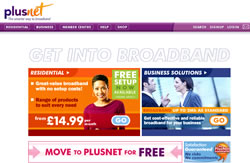 MetroNet, UK broadband ISP, has been purchased by PlusNet in an all cash deal for £1.7m.
MetroNet, UK broadband ISP, has been purchased by PlusNet in an all cash deal for £1.7m. MetroNet has grown since their start in 2003 to 16,000 subscribers, turning over £2.1m bringing an operating profit of £40,000 in the year ended 31 March 2005. They have net cash of over
MetroNet has grown since their start in 2003 to 16,000 subscribers, turning over £2.1m bringing an operating profit of £40,000 in the year ended 31 March 2005. They have net cash of over  We, and we assume other MetroNet subscribers, hope that the high quality of service that we’ve received from them continues, without interruption, in the transition to PlusNet.
We, and we assume other MetroNet subscribers, hope that the high quality of service that we’ve received from them continues, without interruption, in the transition to PlusNet. For techie-obsessives like the Digital Lifestyles crew, keeping connected when we’re away from home is right up there with finding a roof over our heads, so when we went off to New York, we made sure we packed our Sony laptop and Wi-Fi enabled smartphone – even on holiday.
For techie-obsessives like the Digital Lifestyles crew, keeping connected when we’re away from home is right up there with finding a roof over our heads, so when we went off to New York, we made sure we packed our Sony laptop and Wi-Fi enabled smartphone – even on holiday. One rather unfortunate side-effect of all this free connectivity was that once-bustling cafes turned into conversation-free libraries, with rows of transfixed surfers staring intently into their screens, with the silence only broken by intermittent bursts of keyboard activity.
One rather unfortunate side-effect of all this free connectivity was that once-bustling cafes turned into conversation-free libraries, with rows of transfixed surfers staring intently into their screens, with the silence only broken by intermittent bursts of keyboard activity.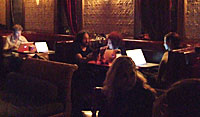 On the street, one handset seemed to be stuck in almost every New Yorker’s hand: the Palm Treo 750. They love the phone!
On the street, one handset seemed to be stuck in almost every New Yorker’s hand: the Palm Treo 750. They love the phone! For a long time, Cisco was only focused on high-end corporate sales. This started to change with its acquisition spree. Back In June 2003 it acquired Linksysin order to attack the home and small business markets.
For a long time, Cisco was only focused on high-end corporate sales. This started to change with its acquisition spree. Back In June 2003 it acquired Linksysin order to attack the home and small business markets. DSL is much cheaper to install as it uses existing phone cabling, ratherthan CATV which requires digging up the road, installing fibre tothe street and co-axial cable to the home (this may not be true forgreenfield sites, but in countries with existing infrastructure likethe UK it is).
DSL is much cheaper to install as it uses existing phone cabling, ratherthan CATV which requires digging up the road, installing fibre tothe street and co-axial cable to the home (this may not be true forgreenfield sites, but in countries with existing infrastructure likethe UK it is). Though Cisco have bought Scientific Atlanta, who manufacture the consumerpiece of the puzzle, by expanding the consumer take-up of IPTV they arealso expanding the core network business. Don’t forget, running IPTV servicesrequires a lot of investment in network infrastructure i.e. moreCisco kit.
Though Cisco have bought Scientific Atlanta, who manufacture the consumerpiece of the puzzle, by expanding the consumer take-up of IPTV they arealso expanding the core network business. Don’t forget, running IPTV servicesrequires a lot of investment in network infrastructure i.e. moreCisco kit.